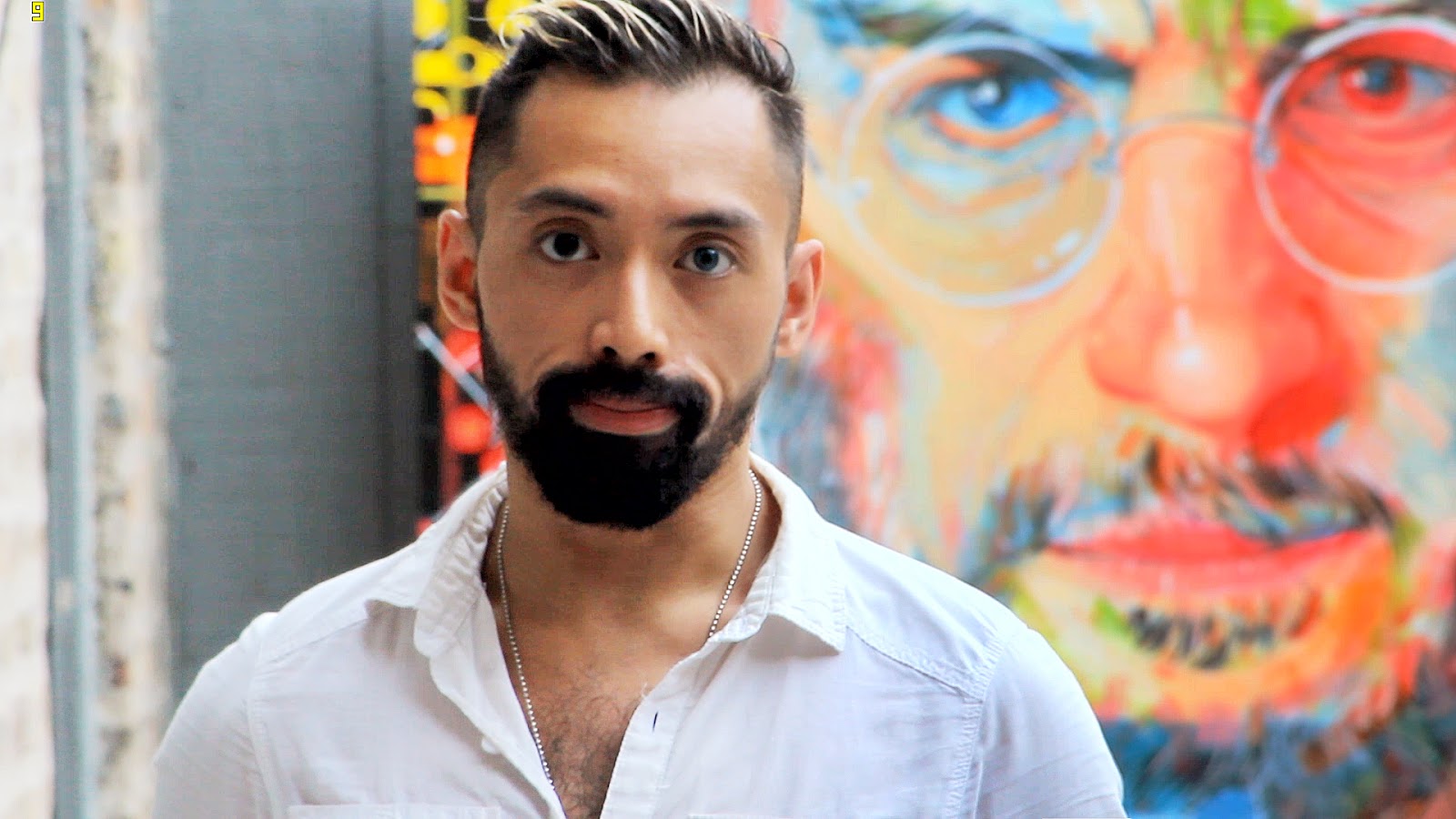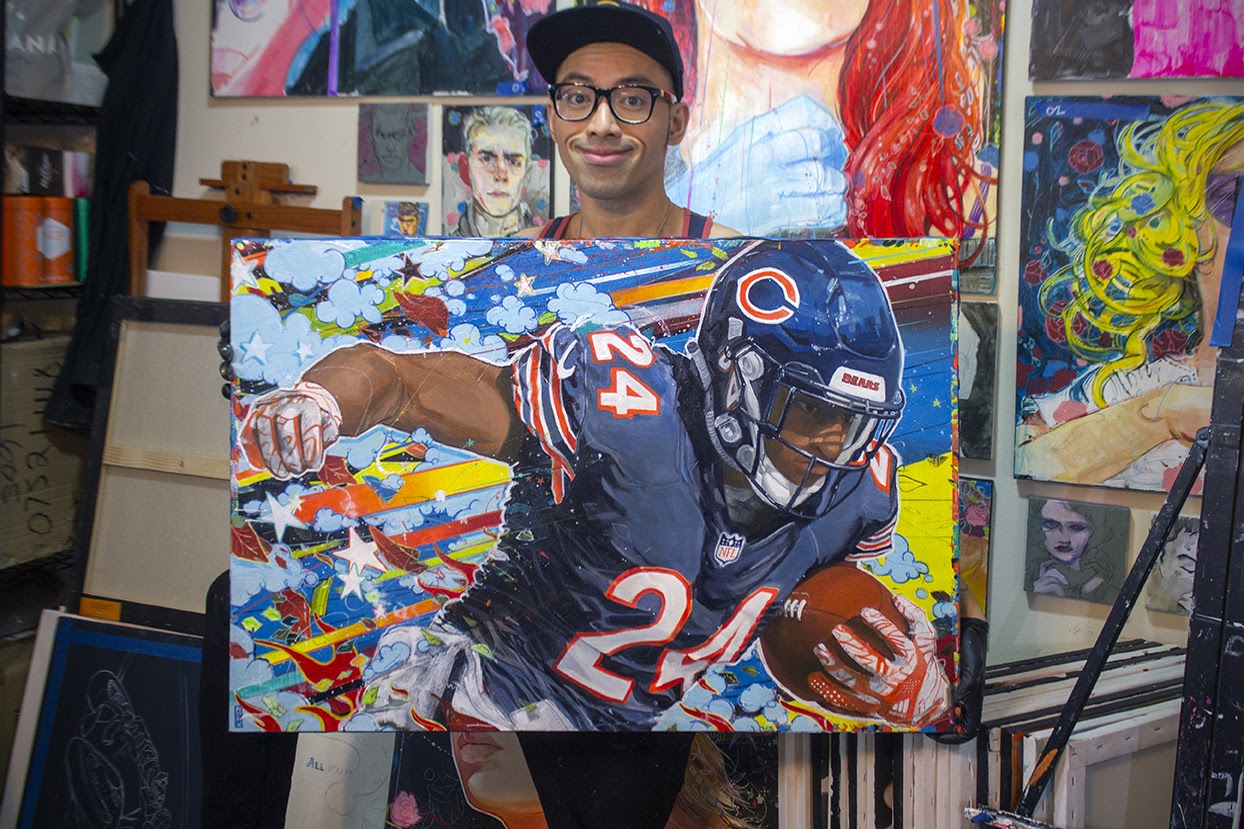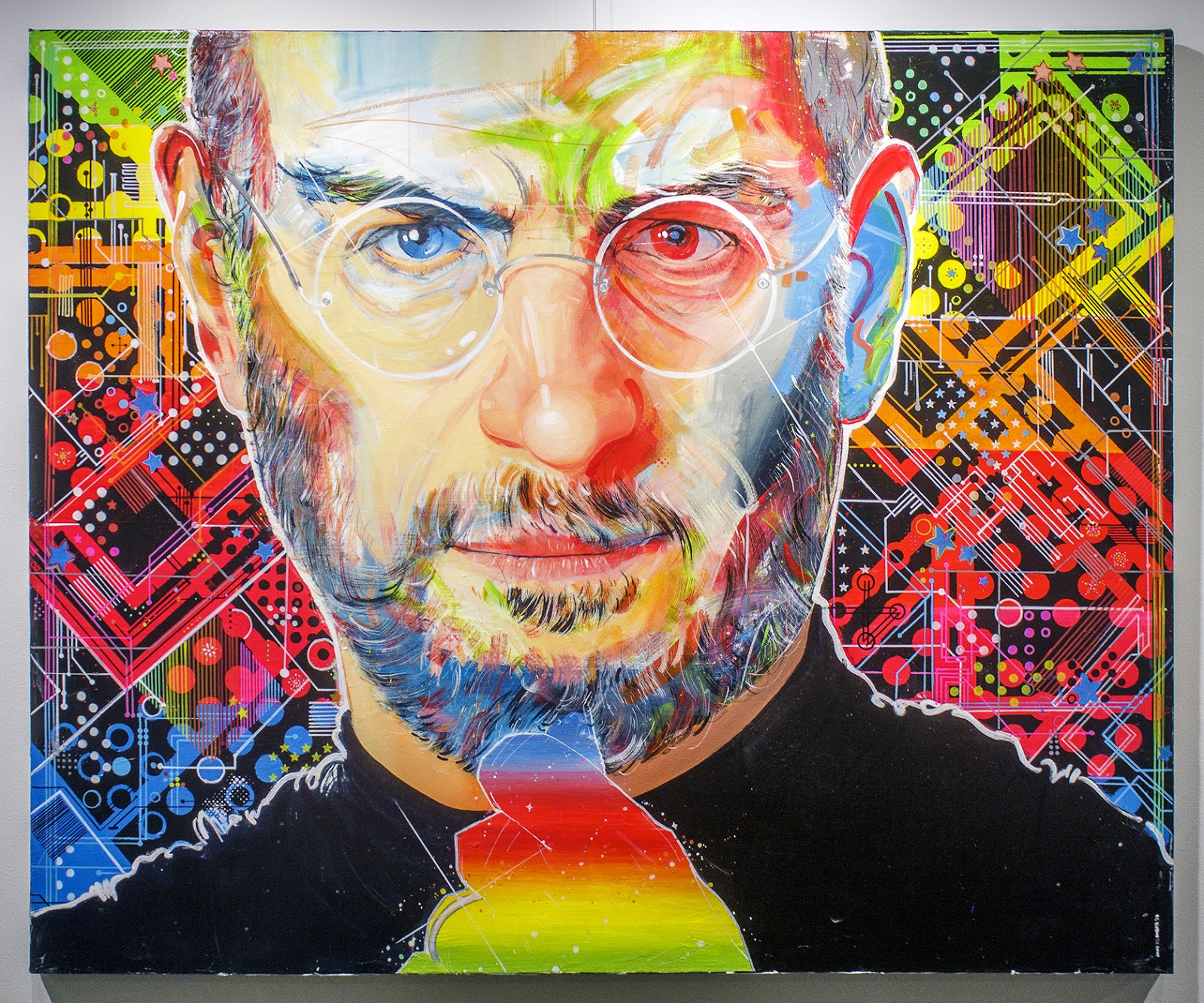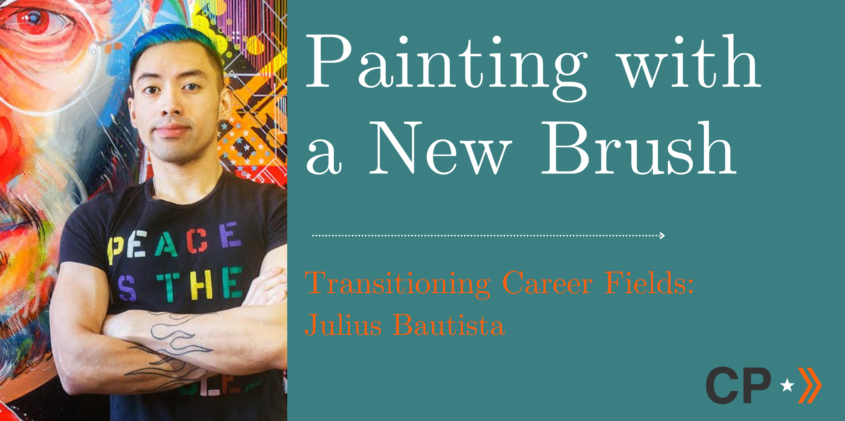Painting with a New Brush
Transitioning Careers: Julius Bautista
Servicemembers are notorious for their adaptability. Being flexible to stressful circumstances and wearing multiple hats for a particular career field is not just expected but necessary to serve in every MOS, AFSC, or NEC. With that said, however, it can still be daunting to shift gears from one industry to the next, but some challenges are worth pursuing.
Julius Bautista, a Veteran and recent Code platoon graduate, is well versed in transitioning having been in several seemingly unrelated career fields. We interviewed him to get a feel for the shift in work experience.

Tell us about your military career?
During my senior year of high school, I enlisted in 2005 with an open contract and was assigned an electrical engineering position. The official title is Engineer Equipment Electrical Systems Technician, which can be a mouthful. I worked on diagnosing, maintaining, and repairing power generators under Combat Logistics Battalion 2, training for what should have been my first deployment.
Unfortunately, my military career was cut short by worsening medical conditions halfway through my contract. If there were a silver lining, those experiences shaped who I am today, but I do sometimes wonder what my life would have been like had I been given the proper care and treatment.
Getting out of the military, what was that like?
It was an experience. My world was turned upside down. I felt as if I let my unit down, but I also felt let down by them, which haunted me for many years. However, it also motivated me to push harder, and it gave me drive. After moving back to my hometown, I got a job with a trucking company doing third shift data entry. It was rough but it allowed me to save up. I made it my priority to get out of the burbs, so I saved up for my first apartment, filled out a college application with the University of Illinois, Chicago, and found a part-time job selling electronics at a Target store.
What is your approach to change?
My approach to life is generally free-spirited. Sometimes, I dread change, and sometimes, I seek it out.
I decided to enlist in the military on a whim, but I was only 17 at the time, so I needed parental consent. My mom hadn’t been in the picture since I was an infant, so my father’s approval was the only option. Not wanting to risk rejection, I waited until midnight when he was asleep, and woke him up, knowing he wouldn’t be interested in reading whatever paper I had in hand. I asked him to sign it, just vaguely saying, “Hey, I need this for school,” so he’d sign it quickly and go back to sleep. I can’t say he was too pleased with my approach, but we just laugh it off these days, and he is quite proud of me now.
What was your college career path?
I went to college undeclared, with no real plan. I just wanted to explore a bunch of different subjects. It was hard to decide because I pretty much enjoyed every subject taught in school and most of the extracurricular activities I participated in during high school. I tried gymnastics, journalism, cross country, A/V club, yearbook. The problem was, I enjoyed so many subjects, but I didn’t excel in any one area and was quite terrible in some. What made a difference was one professor, Dianna Frid, who said to me after class one day that I really should consider a career in the arts because, in her words, “you think like an artist, you speak like an artist, and you move like an artist.” It was flattering but undeniably also a great way to recruit students into the arts program.

How did you get interested in coding?
I got involved with a group called Packback Inc. The couple that started Packback started another organization in 2019 Play Together, to unite artists, musicians, and social impact groups under various projects. Now, that in itself doesn’t involve coding, but being engaged with Play Together and attending Packback’s Makespace events drew me into tech culture.
As for actual coding, I’ve dabbled since my teens, writing simple game modification scripts in C# and Java. In grade school, I had a photoblog, so that was my introduction to HTML and CSS. After college, I joined an artist collective, learning event production and marketing shows for clients, which led to more proficiency with HTML and CSS. My first run-in with Python was through hobby projects, some of which influenced my professional work. A few of my shows utilized RFID tags and NFC-enabled phones to make paintings interactive. I took that concept one step further whenever I wanted to help friends and colleagues promote their shows.
If you’re not familiar with Nintendo’s “Amiibo” product line, they’re little figurines that interact with Nintendo games. For example, in Super Smash Brothers, scanning a Pikachu Amiibo loads up a computer-controlled Pikachu that you can train, team up with, and fight against. Usually, these digital sparring partners have power limits, but if you know what data to tweak, you can hack an Amiibo to give your Pikachu super fast speed and unprecedented levels of power. It can provide your game with new levels of challenge that didn’t exist before.
NFC tags can be purchased in bulk online. They don’t hold much data, so they’re easy and quick to program and modify. They fit nicely in coin capsules and can be safely covered with custom art. I could crank out 20-30 of these in a day, and we would give them away as promotions for shows and events. It was a different way to advertise and that kind of stuff can be really appealing. It’s innovative, it’s different and it draws people in.

It is clear that art still plays a big role in your life, and you don’t want to separate the world of programming from art, but are there any similarities between the two for you?
Have you ever tried attaching a succinct definition to ‘art’? It’s probably not as easy for most to conceptualize the meaning of art to conceptualize the essence of programming because coding comes with an objective purpose and tangible real-world goals.
It’s not that contemporary art lacks that tangibility, but its form of truth is more elusive, ethereal, and formless than logic. It comes from a place of emotional intelligence.
One of the most valuable lessons I’ve learned in life was picked up during my sophomore year of college, writing an essay on French theorist Roland Barthes’ piece “The Death of the Author”. My takeaway – art is not created by the artist but by the artist and the environment that surrounds them. A user’s interpretation of a work of art is equally as real as the artist’s intent because the world of art is subjective and interpretive.
In programming, the same relationship exists, except whereas the arts are concerned with the expression and interpretation of subjective truths, the logical world of programming is concerned with objective facts. Both are equal forms of creation that have the power to transport you into other worlds, and as a creator, it feels natural to walk the line between these two fields.
What led you to enroll with Code Platoon?
The VA announced that it had a program for military folks to get into tech careers. VET TEC covered tuition for approved organizations. Code Platoon was one of the options available in Chicago, and after researching and comparing different programs, Code Platoon was the one that I felt was most earnest and authentic. Meeting with a few alumni and staff strengthened and reinforced the feeling that Code Platoon was invested in the future of their students, as opposed to simply pocketing tuition payments, which was very important to me. Committing to a second field can be frightening and anxiety-inducing, so it meant a lot to me to have a network that I felt I could trust and count on.
You mentioned that you had experience with tech before Code Platoon. Did you encounter any learning curves?
Oh, for sure! I had been dabbling in tech on my own as a hobby, but in knowing that it was just and only that, dabbling, there was a lot of insecurity. It was imposter syndrome, and that’s a topic that came up a lot during the course. There’s so much value to assigning a name to that particular kind of doubt and knowing that you’re not alone in experiencing it.
The other big learning curve is the linearity of software engineering. I noticed this, especially when pairing up with some of my fellow grads. My mind is so accustomed to jumping from idea to idea because that sense of liberty and play is crucial to developing a knack for subjective expression.

In regards to more logical expression, I sometimes felt a few steps behind, if not in an entirely different place in my mind at times, and I had to be proactive in working past that. The funny thing is, being more proficient with coding also benefits artistic practice. I feel more grounded, and I have a newfound sense of clarity and confidence.
What would you say to somebody who is like looking into programming but doesn’t feel that they have the skillsets for the field?
One thing that can make computer programming intimidating is the rapid pace at which it evolves. That can stoke fears of being inadequately prepared or, worse, becoming obsolete. There is a positive side to this, though because you’re not alone in picking up new technologies.
Everyone in the software engineering field shares the same responsibility of being prepared to continue learning and picking up new things. The world of programming may seem vast and daunting, but the same can be said of virtually any other field. In the end, it’s a matter of perspective.
Veterans, in particular, develop a feel for the deep bonds and camaraderie that comes with enlisting in some of our nation’s longest-standing organizations. It’s incredible to me how Code Platoon emulates that. Not only do they support you through 15 weeks of intensive education, but they also provide a very active and engaging alumni network. That’s arguably more valuable than the course itself, but it’s part of the package and there’s no expiration to it.
For any Veteran, active Servicemember, or military spouse looking for a career shift, Code Platoon may be the place to train. Apply today to be a part of the next cohort.
Amanda Michelle Gordon is Code Platoon’s Content Marketing Coordinator. She is a U.S. Air Force Veteran and a student of SUNY New Paltz for Journalism and Sociology. In her free time, Amanda enjoys reading, the outdoors, and turning coffee into copy. You can find Amanda on LinkedIn and Twitter.
Transitioning Careers: Julius Bautista

